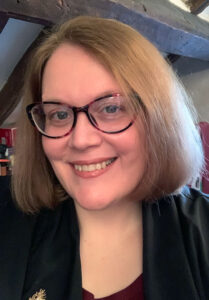 Hello and welcome! I’m Leone, a writer, artist, teacher and researcher based in the beautiful Holme Valley in Yorkshire.
Hello and welcome! I’m Leone, a writer, artist, teacher and researcher based in the beautiful Holme Valley in Yorkshire.
I’ve always been fascinated by stories and how we make them up, which led me to complete a PhD at the Manchester Writing School in 2024. My research explores how writers create and think about AI characters—like robots or talking computers.
Using ideas from something called posthumanism, (a way of thinking that encourages us to look beyond traditional views of what it means to be human), I set out to discover how we could make sure these AI characters do not reinforce old, harmful ideas about gender. In other words, I tried to work out how storytellers can avoid making these characters too much like humans, especially in ways that could lead to misunderstandings about what boys and girls (or men and women) can do or be.

The area of storytelling I’m most interested in at the moment is children’s fiction. I love crafting stories that ignite young imaginations and bringing them to life with illustrations. Aditionally, looking at the work of other children’s writers is a key part of my research.
I also have a background in screenwriting. I went to film school some twenty years ago and completed an MA in that subject. Since then, I’ve helped many writers hone their screenplays into dramatically effective work, both as a university lecturer and through professional script development.
Beyond that, I have a passion for botanical painting, poetry, and a growing interest in science fiction. Of course, I also love to read. In fact, I think reading is one of the most important things you can do if you want to get better at writing.
At the moment, I’m working on various projects that blend these interests. I’m hoping to create new worlds and characters that inspire and entertain, and which will lead me to new areas of research. Whether you’re a young reader, a fellow writer, or just curious about the magic of storytelling, I hope you find something here that sparks your imagination and encourages you to go on reading, writing, and celebrating the myriad of narratives we humans create.